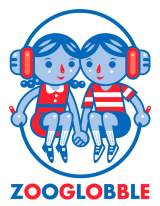Review: Snail Song & Magic Toast - The Sippy Cups
 Wednesday, June 28, 2006 at 4:13PM
Wednesday, June 28, 2006 at 4:13PM Review: A Play in One Act
With three characters: Dude 1, Dude 2, and Mr. Roommate:
Dude 1: Whoa, dude, that Sippy Cups song is deep!
Dude 2: Totally, dude!
Dude 1: I mean, it's about, like, life.
Dude 2: Totally.
Dude 1: It's like... a... uh... simile!
Dude 2: Simile? It is so not a simile, dude.
Dude 1: No, dude?
Dude 2: No, dude. It's a metaphor.
Dude 1: I'm not sure I agree with you, there, dude
Dude 2: Why not?
Dude 1: Well, look, there's this song, and it's about "Magic Toast," right?
Dude 2: Right.
Dude 1: And it sounds just like the Mamas and the Papas, maybe, or some psychedelic band from the late '60s, right?
Dude 2: Right.
Dude 1: So when they're talking about the magic toast and how it gives the boy a "lift," they're clearly making the analogy that breakfast is like life. And the toast is, you know...
Dude 2: Yeah, but what you're describing is a metaphor, dude. They're not using the word "like" or anything.
Dude 1: Hey, what you know about grammar, dude, could fit inside my...
Dude 1's Roommate, dressed as always in suit and tie, walks into the room.
Roommate: Oh, it's you again... dude.
Dude 2: Hey, man, what's your problem? You're always bringin' me down!
Roommate: Well, every time I come home from... what's that place called... oh, yeah, work, you two guys are sitting here eating grilled cheese sandwiches and having these abstract philosophical discussions.
Dude 1: We were not!
Roommate: Oh, really?
Dude 2: Yeah! We were having an abstract grammatical discussion.
Roommate: I don't believe it. What were you guys discussing?
Dude 1 explains the crux of the dilemma.
Roommate: Much as it pains me to say it, dude, your friend is correct. A simile is a figure of speech that expresses a resemblance between things of different kinds and is usually formed with "like" or "as." A metaphor, on the other hand, is a figure of speech in which an expression is used to refer to something that it does not literally denote in order to suggest a similarity.
Dude 1: Ah. Righteous, dude. You bring clarity.
Roommate: What I can't figure out is why you're spending the evening listening -- repeatedly -- to an album that is targeted to kids aged 2 through 7. I know, I know, it's appealing to a lot of adults, and the band's from San Francisco, but "Magic Toast" is neither simile nor metaphor... it's about TOAST! And while that song is OK (I confess to a weakness for the kazoos) and the "Snail Song" has a pretty awesome power pop finale, that's all the EP is. Two original tracks with the other two tracks just being the first two tracks overlaid with spoken word narrative.
Dude 2: Dude, you're just cheap.
Roommate: Uhhh... maybe you're right. Pass the grilled cheese sandwiches.
Dudes 1 and 2: Right on, dude.



 How best to describe the San Francisco-based
How best to describe the San Francisco-based  Pity the preschool children's musician. Forced to play the same set of familiar songs at least some of the time, yet Raffi (and before him, Ella Jenkins, Pete Seeger, Lead Belly, and Woody Guthrie) got there first and staked their claim. Few artists have managed to make a career out of playing the songs that the above artists perfected. (And believe me, many have tried. And failed.) Laurie Berkner is perhaps the only modern artist who's completely succeeded, and her fame is as much for her original music as it is for her rendition of traditional classics.
Pity the preschool children's musician. Forced to play the same set of familiar songs at least some of the time, yet Raffi (and before him, Ella Jenkins, Pete Seeger, Lead Belly, and Woody Guthrie) got there first and staked their claim. Few artists have managed to make a career out of playing the songs that the above artists perfected. (And believe me, many have tried. And failed.) Laurie Berkner is perhaps the only modern artist who's completely succeeded, and her fame is as much for her original music as it is for her rendition of traditional classics.
